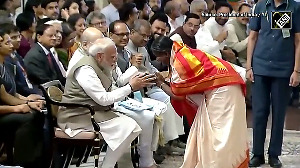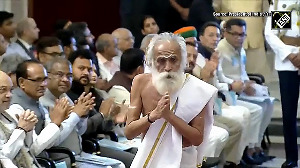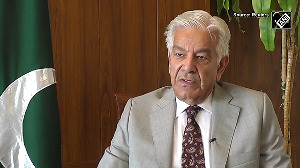Even as the Supreme Court is scheduled to hear the deferment plea in the Ayodhya title suit on September 28, several people in Lucknow are holding talks to ensure that the matter is settled out-of-court.
These people believe that it would be in the best interest of the nation if the matter can be settled out-of-court. Taking the lead is the vice president of the All India Muslim Law Personal Board, Maulana Kalbe Sadiq, who says surely there is a way to settle the matter, and the right efforts in this direction will bring about a solution.
He says he will talk to the board to try and convince them to sort out the matter amicably, and if it fails, he is even ready to fight this matter out by himself.
"I am more concerned about the nation as a whole and this is not a matter pertaining to communities alone. I am confident that this issue will be sorted out soon amicably and I am already in touch with several persons, such as Shankaracharya Swaroopanand Saraswati (of Dwarka). I am hopeful they will all help sort out this matter," Sadiq said.
There are many like Kalbe Sadiq, but the fact is that a majority of those fighting the title suit question any move to sort the matter out-of-court.
Jafaryab Jilani, counsel for the Wakf board, says it is too late for a compromise, but stated that he would wait for what the Supreme Court has to say. Others on the Muslim Law Personal Board too share his view and say they do not wish to comment on what Kalbe Sadiq has to say.
They question the very decision considering an out-of-court settlement when both the parties battling the suit are not in favour of it.
Ramesh Chandra Tripathi, who filed the deferment plea, however has a different view. He says courts can very well interfere in such a case.
He quotes Justice Dharam Veer Sharma's dissenting verdict while adding that the court had relied on the Dr Ismail Farooqi vs Union of India case of 1994. In that case the Supreme Court had said it is a matter suited essentially to resolution by negotiations which does not end in a winner and a loser, while adjudication leads to that end, so that the final outcome does not leave behind any rancour in anyone.
Tripathi's advocate Prashanth Chandra says the Supreme Court can interfere in this case under Articles 142 and 144 of the Constitution.
He further quotes Justice D V Sharma, who had said in his order that before delivering any judgment, every endeavour has to be made to settle the dispute as per prayers made by the applicant, and if the matter is settled through a compromise then it shall be in everybody's interest.
Even as the debate continues, like-minded persons in Lucknow are looking for more applicants to join them at the Supreme Court on September 28 when the matter comes up.
They feel the Supreme Court should appoint a panel of mediators who can tell the apex court that the events of 1992 changed the very course of the nation and it is best that the matter is mediated, since a verdict cannot be delivered on the basis of faith.
To the argument by the other petitioners that several attempts had been made in the past to settle the matter amicably, the ones seeking an out-of-court settlement argue that no concrete efforts had really been made. Three prime ministers handled the Babri Masjid dispute, but none of them made a proper effort to sort out the issue. Further, they say this matter does not concern a few persons from two faiths but needs a full-fledged public participation.









 © 2025
© 2025